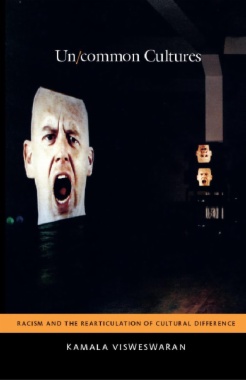In Un/common Cultures, Kamala Visweswaran develops an incisive critique of the idea of culture at the heart of anthropology, describing how it lends itself to culturalist assumptions. She holds that the new culturalism—the idea that cultural differences are definitive, and thus divisive—produces a view of “uncommon cultures” defined by relations of conflict rather than forms of collaboration. The essays in Un/common Cultures straddle the line between an analysis of how racism works to form the idea of “uncommon cultures” and a reaffirmation of the possibilities of “common cultures,” those that enact new forms of solidarity in seeking common cause. Such “cultures in common” or “cultures of the common” also produce new intellectual formations that demand different analytic frames for understanding their emergence. By tracking the emergence and circulation of the culture concept in American anthropology and Indian and French sociology, Visweswaran offers an alternative to strictly disciplinary histories. She uses critical race theory to locate the intersection between ethnic/diaspora studies and area studies as a generative site for addressing the formation of culturalist discourses. In so doing, she interprets the work of social scientists and intellectuals such as Elsie Clews Parsons, Alice Fletcher, Franz Boas, Louis Dumont, Claude Lévi-Strauss, Clifford Geertz, W. E. B. Du Bois, and B. R. Ambedkar.
- Contents
- Acknowledgments
- Introduction: Un/common Cultures: Racism and the Rearticulation of Cultural Difference
- 1. Wild West Anthropology and the Disciplining of Gender
- 2. Race and the Culture of Anthropology
- 3. The Interventions of Culture: Claude Lévi-Strauss and the Internationalization of the Modern Concept of Race
- 4. Is There A Structural Analysis of Racism? Louis Dumont and the Caste School of Race Relations
- 5. India in South Africa: Counter-genealogies for a Subaltern Sociology
- 6. Legacies of Culture, Languages of the State
- 7. Gendered States: Rethinking Culture as a Site of South Asian Human-Rights Work
- Epilogue: The Traffc in Social Movements: Narmada, Bhopal, Texas
- Notes
- Bibliography
- Index

